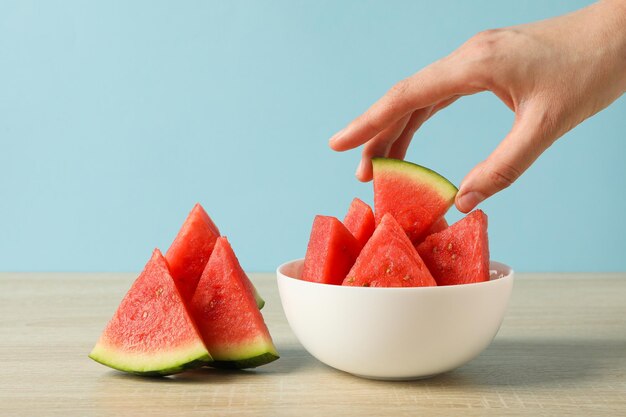Your Guide to Is Watermelon Okay For Diabetics
What You Get:
Free Guide
Free, helpful information about Diabetes FAQ and related Is Watermelon Okay For Diabetics topics.
Helpful Information
Get clear and easy-to-understand details about Is Watermelon Okay For Diabetics topics and resources.
Personalized Offers
Answer a few optional questions to receive offers or information related to Diabetes FAQ. The survey is optional and not required to access your free guide.
Is Watermelon Safe for Diabetics? Here's What You Need to Know
Watermelon is a quintessential summer treat, known for its refreshing sweetness and hydrating properties. But for those with diabetes, indulging in this juicy fruit often raises concerns. Is watermelon a safe choice for diabetics? Understanding the nutritional profile and impact on blood sugar is crucial for making informed dietary decisions.
Watermelon and Blood Sugar
Watermelon is a high-glycemic-index (GI) food, meaning it can cause a rapid spike in blood sugar levels. However, its glycemic load (GL), which considers both the glycemic index and the actual carbohydrate content of a typical serving, is relatively low due to its high water content. This suggests that moderate consumption may not significantly impact blood sugar when paired with other low-GI foods.
Key considerations for diabetics:
- Portion Control: Stick to small portions to minimize blood sugar spikes.
- Balancing Act: Combine watermelon with proteins or fats to slow down sugar absorption.
- Monitor: Keep track of blood sugar levels after consumption to understand its impact on your body.
Despite its sugar content, watermelon is packed with beneficial nutrients like vitamins A and C, potassium, and antioxidants such as lycopene, which can promote health and well-being.
The Nutritional Lowdown
A one-cup serving of diced watermelon contains:
- Calories: Approximately 46
- Carbohydrates: 11.5 grams
- Sugars: 9.4 grams
- Fiber: 0.6 grams
Hydration and Satiety: Watermelon's high water content aids in hydration and can provide a sense of fullness, which may help manage cravings and overall appetite.
Considering Healthier Lifestyle Choices
Living with diabetes involves a thorough approach to nutrition, lifestyle, and health management. If limiting watermelon in your diet feels like a setback, consider other avenues to achieve better health and stability.
Financial and Educational Resources for a Healthier Life
Managing diabetes goes beyond diet. Access to resources like financial assistance or educational programs can empower you to make informed choices, reduce stress, and improve your overall well-being.
- Government Health Programs: Look into programs such as Medicaid or Medicare that can help cover diabetes education, nutrition counseling, and medical equipment.
- Financial Assistance for Medical Supplies: Some non-profits and community groups offer support to those struggling with the cost of medications or supplies.
- Educational Grants for Health Courses: Education about diabetes management, nutrition, and wellness can empower you to take control of your health.
Remember, seeking knowledge and resources can be a transformative step in your diabetes management journey. Understanding how your body reacts to certain foods and utilizing available resources can lead to a healthier, more balanced life.
Helpful Resources & Tools:
- 💸 Government Aid Programs: Medicaid, Medicare
- 🏥 Financial Support: Non-profit assistance for medical supplies
- 📚 Educational Grants: Courses in health and nutrition
- 🤝 Community Support: Local health workshops and counseling
What You Get:
Free Diabetes FAQ Guide
Free, helpful information about Is Watermelon Okay For Diabetics and related resources.

Helpful Information
Get clear, easy-to-understand details about Is Watermelon Okay For Diabetics topics.

Optional Personalized Offers
Answer a few optional questions to see offers or information related to Diabetes FAQ. Participation is not required to get your free guide.


